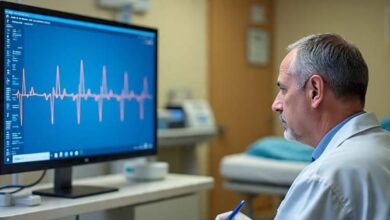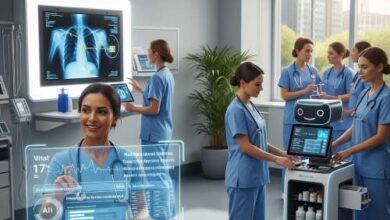Best trend: How Digital Health Technology Is Revolutionizing Nursing in 2025
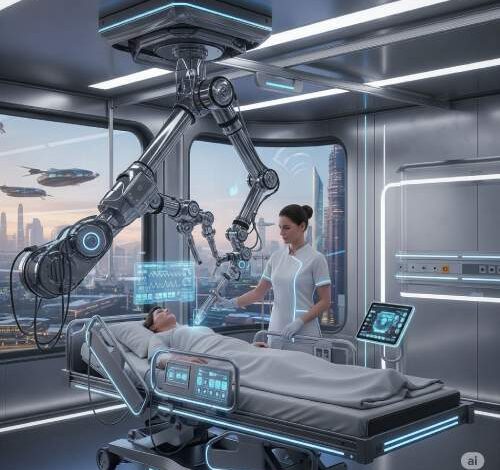
Best Trend: How Digital Health Technology Is Revolutionizing Nursing in 2025
In 2025, Digital Health Technology in Nursing has become one of the most powerful forces shaping modern healthcare. From smart wearables that monitor patient vitals in real time to AI-powered tools that help nurses detect early signs of complications, digital innovation is no longer a distant dream — it’s the new reality.

This transformation is not just about gadgets or apps; it’s about how technology is making nursing more efficient, patient-centered, and deeply human.
For decades, nurses have been the heart of healthcare — providing hands-on care, emotional support, and critical observation. But today, Digital Health Technology in Nursing is giving these professionals the ability to do even more. Imagine a nurse monitoring multiple patients remotely through cloud-based dashboards or receiving instant alerts when a patient’s condition changes. These innovations are helping reduce hospital errors, improve patient safety, and streamline workloads.
A great example comes from Sarah, an ICU nurse in California, who once struggled to manage six high-risk patients during night shifts. With new digital monitoring tools, she now tracks all vital signs through a single interface, allowing her to respond faster and focus more on human care rather than constant charting. “It feels like I have an extra pair of hands,” she says. Stories like hers highlight why the rise of digital health technology in nursing is one of the best trends of 2025 — it empowers nurses, saves lives, and reshapes how care is delivered.
Whether it’s telehealth platforms, electronic health records (EHRs), smart IV pumps, or AI-assisted documentation, technology is simplifying complex nursing tasks and giving professionals more time for what truly matters — the patient. The combination of human empathy and digital intelligence is creating a new era of healthcare where nurses don’t just adapt to technology they lead it.
Easy Guide: Incorporating Technology and AI in Nursing Teaching 2025
Top Digital Health Trends Transforming Nursing in 2025
The healthcare landscape is changing faster than ever, and Digital Health Technology in Nursing is leading the transformation. Nurses are now leveraging cutting-edge tools that make patient care smarter, faster, and safer. Below are the top digital health trends redefining the nursing profession in 2025 — each one bringing a wave of innovation and hope.
1. AI-Powered Clinical Decision Support
Artificial intelligence is no longer just for doctors or researchers. In 2025, AI has become a nurse’s trusted partner. These tools analyze patient data instantly, alerting nurses to potential complications before they happen — such as early signs of infection or sepsis. This proactive approach is helping nurses make better, faster, and more accurate clinical decisions, especially in emergency and critical care settings.
2. Wearable Health Devices and Remote Monitoring
From heart rate trackers to oxygen sensors and glucose monitors, wearable health devices are allowing nurses to monitor patients in real time — even outside hospital walls. This is especially valuable for chronic disease management, post-surgical care, and elderly patients who prefer home-based recovery. Digital Health Technology in Nursing has turned remote care into a powerful tool for continuous health monitoring.
3. Smart Documentation and Electronic Health Records (EHRs)
Gone are the days of handwritten notes and endless paper charts. Advanced EHR systems now use automation and voice recognition to simplify documentation. Nurses can record patient data with a few taps or even through speech, reducing administrative burden and freeing more time for direct care.
4. Telehealth and Virtual Nursing
Virtual nursing consultations and telehealth platforms are bridging the gap between patients and healthcare providers. Rural hospitals, in particular, now rely on tele-nurses who offer expert support from across the country. This trend is making healthcare more accessible, equitable, and efficient — a major milestone in the digital transformation of nursing.
Benefits of Digital Health Technology in Nursing
The growing adoption of Digital Health Technology in Nursing isn’t just about keeping up with trends — it’s about creating real, measurable improvements in healthcare outcomes.
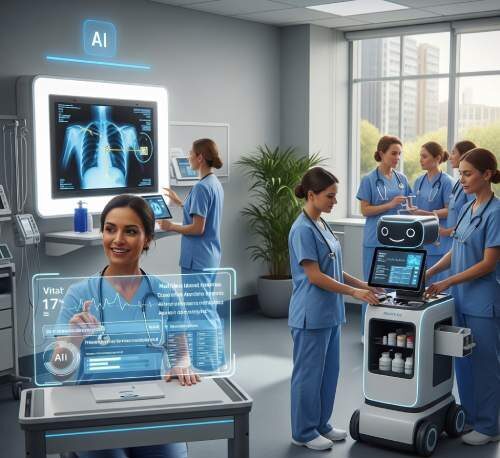
From saving time to improving accuracy, the benefits of digital health tools are transforming how nurses work, think, and care for their patients.
1. Improved Patient Safety and Early Intervention
Digital health systems now allow nurses to detect critical changes in a patient’s condition within seconds. With AI-driven alerts, remote sensors, and predictive analytics, nurses can act quickly — often preventing complications before they become life-threatening. For example, continuous glucose monitors can notify nurses when a diabetic patient’s sugar levels drop, allowing instant intervention.
2. Reduced Workload and Burnout
Nursing is one of the most demanding professions, and burnout has always been a challenge. But Digital Health Technology in Nursing has introduced automation tools that simplify documentation, medication administration, and data entry. Smart EHRs and mobile apps help nurses complete tasks faster, giving them more time for patient interaction and less stress during shifts.
3. Enhanced Communication and Team Collaboration
Modern digital tools enable real-time communication between nurses, doctors, and other healthcare professionals. Platforms that integrate messaging, video calls, and instant updates ensure no patient detail is missed. Whether it’s sharing test results or coordinating discharge plans, nurses can now collaborate seamlessly across departments and even across different facilities.
4. Better Patient Engagement and Education
Technology isn’t just empowering nurses — it’s also helping patients become active participants in their own care. Through digital platforms, nurses can share educational materials, monitor patient progress remotely, and offer follow-up guidance. This leads to improved patient satisfaction and better long-term health outcomes.
5. Accurate and Efficient Data Management
With the integration of cloud-based systems, Digital Health Technology in Nursing ensures that patient data is secure, accurate, and easily accessible. Nurses can pull up patient histories, medication records, and lab results instantly, which helps reduce errors and improve decision-making accuracy.
Challenges and Limitations of Digital Health in Nursing
While Digital Health Technology in Nursing is bringing remarkable improvements to patient care, it also presents a unique set of challenges. Nurses across the U.S. are learning to adapt not only to new systems but also to the rapid pace of technological change. Understanding these challenges is essential to ensure that digital tools enhance — not complicate — the nursing experience.
1. Technology Learning Curve
Many nurses, especially those who began their careers before the digital era, find it difficult to adapt to new systems quickly. Learning how to use electronic health records, smart devices, or AI-assisted platforms can be overwhelming without proper training. This learning curve can temporarily slow workflow and create frustration if support is limited.
2. Data Privacy and Security Concerns
As patient data moves to digital platforms, concerns about privacy and cybersecurity continue to grow. Nurses handle sensitive information daily, and any data breach can have serious consequences. Hospitals must therefore invest in strong cybersecurity protocols and train staff on safe digital practices to protect patient confidentiality.
3. High Implementation Costs
Introducing Digital Health Technology in Nursing requires substantial investment in infrastructure, software, and maintenance. Smaller healthcare facilities often struggle to afford these tools, leaving them behind in the digital transformation. This creates inequality in how patients access high-quality, tech-enabled care.
4. Risk of Overreliance on Technology
Technology is an incredible aid — but it’s not infallible. System errors, software glitches, or internet downtime can disrupt workflow and patient monitoring. Nurses must maintain their clinical judgment and critical thinking skills rather than depending entirely on digital tools.
5. Ethical and Human Connection Challenges
One concern many nurses share is that increased screen time can reduce face-to-face interaction with patients. The human touch — the compassion and empathy that define nursing — must never be replaced by technology. Finding a balance between digital efficiency and personal care remains one of the greatest challenges of 2025.
Surprising Telehealth Nursing Training Tips for Success in US 2025
Future Outlook: The Evolving Role of Nurses in a Digital World
As healthcare continues to evolve, the future of nursing in the United States looks brighter and more tech-driven than ever before. Digital Health Technology in Nursing is no longer a temporary innovation — it’s the foundation for a smarter, more efficient, and patient-centered healthcare system.
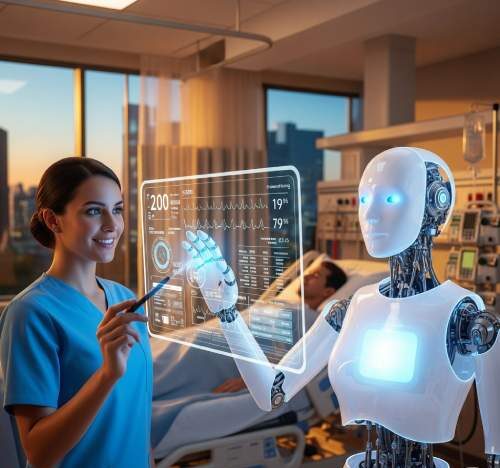
The nurses of 2025 and beyond are not just caregivers; they are also digital health leaders, data interpreters, and technology advocates.
1. Nurses as Digital Health Leaders
In the future, nurses will play a central role in shaping how technology is used in hospitals and clinics. They’ll be responsible for integrating digital tools into daily practice, ensuring systems are practical, ethical, and patient-friendly. Nursing leadership positions will increasingly require tech literacy, giving rise to new roles such as “Digital Health Nurse Specialist” and “Clinical Informatics Nurse.”
2. Continuous Learning and Skill Development
As technology advances, lifelong learning becomes essential. Nurses are expected to receive ongoing training in AI systems, telehealth platforms, and data analytics. Universities and online programs are already offering certifications in Digital Health Technology in Nursing, preparing the next generation to navigate high-tech healthcare environments with confidence.
3. Greater Focus on Preventive and Predictive Care
The integration of smart health monitoring and predictive analytics means nurses can identify risks before they escalate. This shift toward preventive care will redefine nursing responsibilities, allowing professionals to manage population health more effectively and reduce hospital readmissions.
4. Bridging the Human-Technology Gap
Even as automation and artificial intelligence grow, the nurse’s role as a compassionate caregiver remains irreplaceable. The future will require nurses who can balance digital precision with emotional intelligence — ensuring that healthcare remains humane, personal, and empathetic.
5. Expanding Global Opportunities
Nurses trained in Digital Health Technology will find themselves in high demand worldwide. With the global rise of telemedicine, U.S.-based nurses will be able to work remotely, consult internationally, and participate in global health initiatives from the comfort of their homes. This opens doors to new income streams, professional growth, and career freedom.
Easy Steps: How Nigerian Nurses Can Easily Obtain a Qatar Nursing License in 2025
Conclusion: Why Digital Health Is the Best Trend Shaping the Future of Nursing
The rise of Digital Health Technology in Nursing is more than a technological shift, it’s a human transformation. Across hospitals, clinics, and home-care settings in the U.S., nurses are discovering new ways to combine compassion with innovation.

What once seemed like futuristic ideas AI-powered decision-making, remote patient monitoring, and data-driven care have now become part of everyday nursing practice.
This digital revolution isn’t about replacing nurses but empowering them. It’s giving nurses the ability to save more lives, reduce stress, and spend more time doing what matters most — caring for patients. In a world where efficiency, precision, and accessibility define success, Digital Health Technology in Nursing ensures that no patient is left behind, and no nurse is overburdened by outdated systems.
The best part? The trend is still growing. As 2025 unfolds, we’ll continue to see breakthroughs that redefine what’s possible in healthcare. From smart hospitals to personalized telehealth, technology will keep expanding nursing’s potential not limiting it.
Ultimately, the future belongs to nurses who embrace change. Those who adapt, learn, and lead in this digital era will not only stay relevant but also thrive. The combination of technology and human care is proving to be the most powerful healing force of our time one that will continue to revolutionize nursing for decades to come.
Power Guide: How to Verify Nursing Documents for UK NMC from Nigeria 2025
Resources
If you’d like to learn more about Digital Health Technology in Nursing and how it’s transforming healthcare in 2025, here are credible resources to explore:
-
American Nurses Association (ANA) – https://www.nursingworld.org
Covers current trends in digital health, telehealth, and nursing informatics. -
National Institute of Nursing Research (NINR) – https://www.ninr.nih.gov
Provides updates on research and innovation in nursing science, technology, and patient care. -
HealthIT.gov – https://www.healthit.gov
Offers federal resources and insights on electronic health records, patient safety, and data innovation. -
American Telemedicine Association (ATA) – https://www.americantelemed.org
Explores telehealth adoption, nursing roles in remote care, and digital transformation in U.S. healthcare. -
World Health Organization (WHO) – Digital Health Reports – https://www.who.int
Global perspective on how digital health tools support patient outcomes and strengthen healthcare systems.
FAQs About Digital Health Technology in Nursing
Digital Health Technology in Nursing refers to the use of innovative digital tools such as electronic health records (EHRs), telehealth platforms, wearable monitoring devices, and AI-powered software to support nurses in delivering efficient, accurate, and patient-centered care. It helps streamline workflows, improve patient safety, and enhance clinical decision-making.
In 2025, technology is transforming nursing by automating documentation, improving real-time communication, and enabling remote patient monitoring. Artificial intelligence (AI) assists nurses in detecting early signs of complications, while telehealth allows them to reach patients in remote or underserved areas — making healthcare more accessible and efficient.
The main benefits include:
Faster and more accurate patient assessments
Reduced nurse workload and stress
Improved communication among healthcare teams
Enhanced patient education and engagement
Real-time monitoring and early intervention in emergencies
These improvements lead to better patient outcomes and overall healthcare quality.
Yes, while Digital Health Technology in Nursing brings many benefits, it also has challenges. These include high setup costs, privacy and cybersecurity concerns, and the need for continuous training. Some nurses may also struggle with adapting to new systems or balancing screen time with patient interaction.
Nurses must develop digital literacy, data management, and critical thinking skills. They should understand how to use EHRs, interpret data from wearable devices, and apply AI-assisted insights in patient care. Soft skills like communication and adaptability are also crucial in this fast-changing healthcare environment.
No — technology will never replace nurses. Instead, it will enhance their capabilities. While machines handle repetitive or data-heavy tasks, nurses continue to provide emotional support, critical judgment, and compassion — the irreplaceable human elements of healthcare.
Nurses can prepare by enrolling in digital health or nursing informatics programs, attending workshops, and staying updated with the latest trends. Embracing technology early not only improves job performance but also opens new opportunities for leadership roles in digital health innovation.
